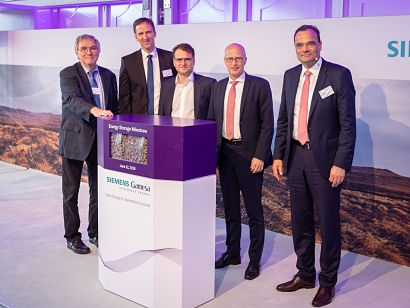
The heat storage facility utilises around 1,000 tonnes of volcanic rock as an energy storage medium and is fed with electrical energy converted into hot air by means of a resistance heater and blower. When demand peaks, the facility uses a steam turbine for the reelectrification of the stored energy. The pilot plant can thus store up to 130 MWh of thermal energy for a week, the capacity remaining constant throughout the charging cycles.
The aim of the pilot plant is to demonstrate the system on the grid and to test the heat storage facility extensively. Siemens Gamesa is planning to use the storage technology in commercial projects and to scale up the capacity and power. The goal is to store energy in the range of several gigawatt hours (GWh) in the near future.
“Decoupling generation and consumption of fluctuating renewable energy via storage is an essential contribution to implementing the energy system transformation” said Andreas Feicht. “We therefore need cost-effective, efficient and scalable energy storage systems”.
Markus Tacke, CEO Siemens Gamesa, added that with the commissioning of the ETES pilot plant, the company has reached an important milestone on the way to introducing high-performance energy storage systems. The technology makes it possible to store electricity for a great many households at low cost, reducing costs for larger storage capacities to a fraction of the usual level for battery storage.
The Institute for Engineering Thermodynamics at Hamburg University of Technology and the local utility company Hamburg Energy are partners in the Future Energy Solutions project, which is funded by the German Federal Ministry of Economics and Energy. Hamburg University is carrying out research into the thermodynamic fundamentals of the technology. By using standard components, it is possible to convert decommissioned conventional power plants into green storage facilities. Hamburg Energy is marketing the stored energy on the electricity market and is developing highly flexible digital control system platforms for virtual power plants.
Image: Prof. Dr.-Ing. Gerhard Schmitz, Technical University Hamburg (TUHH), Michael Prinz, Managing Director Hamburg Energie GmbH, Andreas Feicht, State Secretary, Ministry of Economic Affairs and Energy, Peter Tschentscher, First Major of Free and Hanseatic City of Hamburg and Markus Tacke, CEO Siemens Gamesa Renewable Energy
For additional information:

